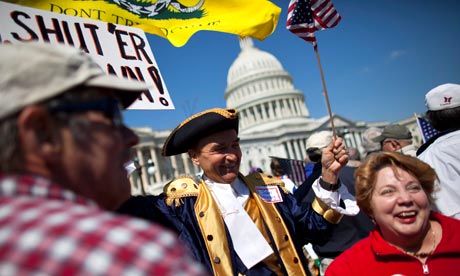Tea Party movement keeps up pressure despite lower profile
Republican presidential candidates will have to balance appeasing conservatives with appealing to moderate voters

Tea Party demonstrators outside the US Capitol to pressurise Republicans into make further budget cuts. Photograph: Jim Lo Scalzo/EPA
Five months ago a ragtag army of disaffected conservative voters calling itself the Tea Party movement took Washington by storm.
Thousands of activists across the country delivered Barack Obama a bloody nose, helping to return 87 new Republicans to Congress and shifting the balance of power on Capitol Hill sharply to the right.
Commentators predicted then that the Tea Parties had permanently changed the face of American politics. But this week a very different impression was given, with signs of an apparent wane in popularity.
In the most vivid indication of the Tea Parties' changing fortunes, their TV darling Glenn Beck was toppled from his Fox News throne. A year ago the broadcaster-cum-preacher-cum-clown appeared invincible with almost 3 million viewers tuning in to his rants, but by last month his ratings had fallen below 2 million and he had become the target of a boycott of Fox advertisers angered by his extreme comments.
The sidelining of Beck has been mirrored by the apparent paling of that other Tea Party favourite, Sarah Palin. She acted as kingmaker in the November mid-term elections, endorsing several Tea Party candidates who are now prominent in Congress, but surveys of voters in key electoral states such as Iowa suggest her star has been falling.
Opinion polls reflect a similar trend among the Tea Parties generally.
A Wall Street Journal/NBC poll this week suggested that 44% of Americans feel negatively towards the movement, up from 30% in January.
But prominent figures within the movement insist that the impression that it has gone off the boil belies reality. "The idea that the Tea Party has waned is a total misreading of what has happened," said Matt Kibbe, president of FreedomWorks, a Washington-based group that has spearheaded local groups. "We've evolved from a protest movement to a get-out-the-vote machine last November to what we are today – a network of local groups holding our representatives to account."
Jeffrey Berry, professor of politics at Tufts university, agrees that though the Tea Parties have kept a low profile since November they should by no means be written off. They have continued to wield influence within Congress by threatening to have Republican politicians such as Orrin Hatch of Utah and Dick Lugar of Indiana unseated in 2012 should they fail to follow a cost-cutting right-wing agenda.
Berry believes they have had a chilling effect across the Republican party, forcing Congress members to swing to the right out of an instinct for sheer self-preservation. "If you threaten one, you threaten all," he said.
The potential shutdown of the federal government that has dominated Washington debate this week is a case in point. The hard line taken by Republican leaders in refusing to compromise over $60bn in cuts to the federal budget, and in imposing socially conservative demands such as the withdrawal of funding for the abortion provider Planned Parenthood, bears the classic hallmark of the Tea Parties.
"The strong stance the Republicans have taken over the budget is a direct result of the strong stance of Tea Party groups," said Sal Russo, one of the main strategists behind the movement who runs the Tea Party Express from his political consultancy in Sacramento, California.
Russo said that the Tea Parties did not want the shutdown, as that would be a "bad result for America". But he said he was prepared to see it go ahead, despite the massive disruption it would entail, should that be necessary to secure substantial cuts in federal spending.
This resistance to normal political deal-making in favour of a purist stance on policy has been seen before with the Tea Parties. Last year they backed maverick right-wing candidates such as Christine O'Donnell and Sharron Angle in senate races in Delaware and Nevada respectively even though they knew such candidates had little chance of winning and would cost the Republicans influence in Congress.
There are risks too in the uncompromising posture they have adopted over the budget crisis. The last time there was a shutdown of the federal government, in 1995, the Republicans then led by Newt Gingrich were largely blamed for it, handing an electoral gift to Bill Clinton who went on to a second term in the White House.
The same electoral headache could now face the current Republican leadership in next year's presidential race.
"The big question for Republican candidates next year will be can they balance the right-wing policies that are being forced on them by the Tea Parties with the need to appeal to more moderate independent voters. That could be very beneficial to President Obama as he seeks re-election," said Neera Tanden of the liberal thinktank the Centre for American Progress who served in the Obama administration.
The Tea Parties are already gearing up for 2012. The Tea Party Express will be staging its fifth national bus tour this summer leading up to a debate with all of the main Republican presidential candidates in Tampa, Florida, in September. FreedomWorks is focusing on 12 senate races that it thinks it can win from the Democrats.
Both groups are contemplating endorsing their chosen nominee for the presidency – a factor that could have a powerful impact as the Republican debate gets under way.
No comments:
Post a Comment